Entrepreneurship: Reflection and Interview Analysis, University Report
VerifiedAdded on 2023/01/13
|14
|3119
|43
Report
AI Summary
This report provides a comprehensive analysis of entrepreneurship, combining a critical reflection on relevant theories with an in-depth interview analysis. The first part of the report explores various facets of entrepreneurship, including the importance of innovation, the characteristics of successful entrepreneurs, and the factors that influence entrepreneurial ventures. It examines the evolution of entrepreneurial mindsets and the significance of strategic decision-making. The second part presents an interview analysis of Srikumar Misra, the entrepreneur behind Milk Mantra, a dairy business in India. The analysis focuses on his entrepreneurial journey, motivation, knowledge, and leadership experiences, highlighting the challenges and successes of his venture. The report concludes by summarizing the key findings and emphasizing the importance of innovation, risk-taking, and strategic planning in the field of entrepreneurship.
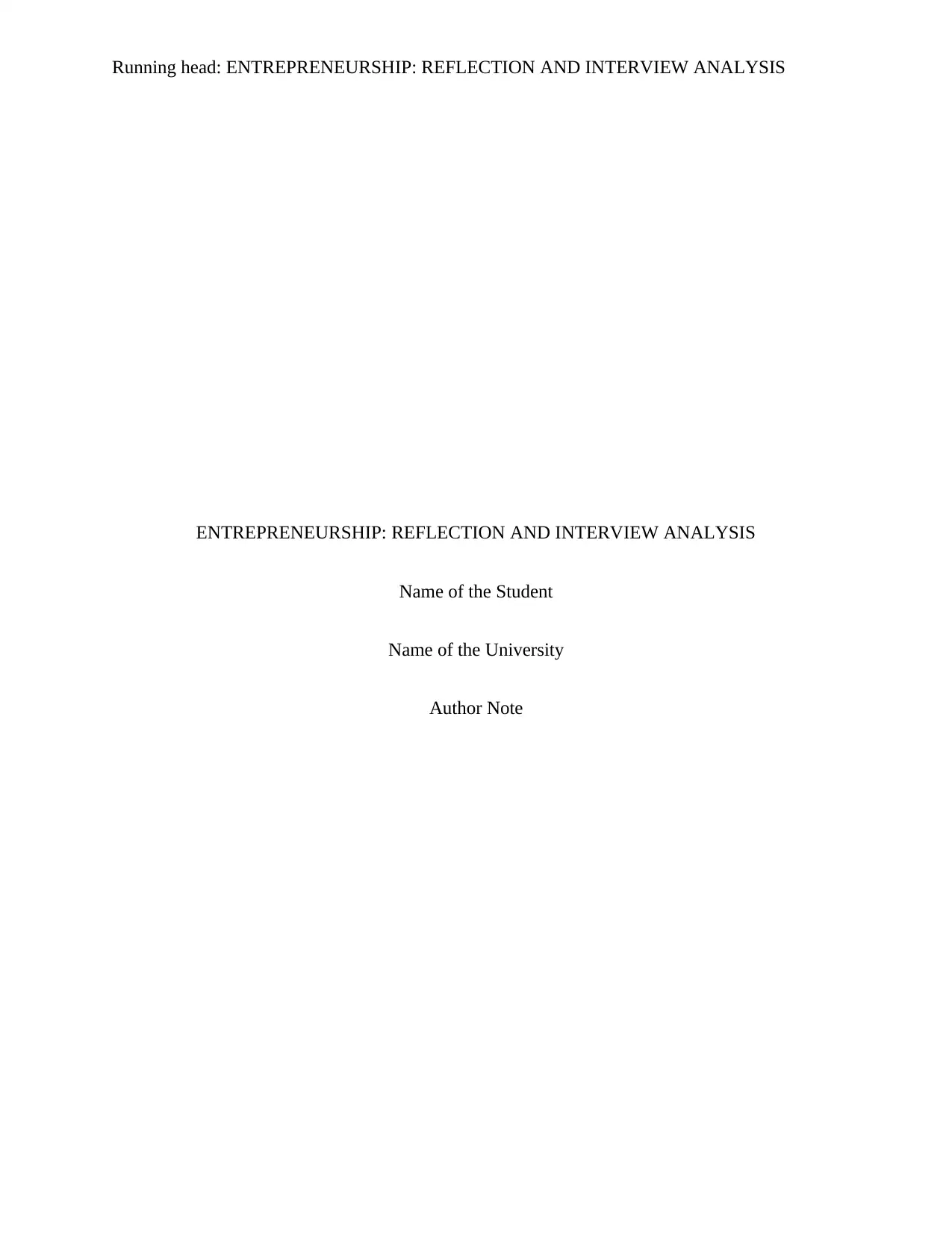
Running head: ENTREPRENEURSHIP: REFLECTION AND INTERVIEW ANALYSIS
ENTREPRENEURSHIP: REFLECTION AND INTERVIEW ANALYSIS
Name of the Student
Name of the University
Author Note
ENTREPRENEURSHIP: REFLECTION AND INTERVIEW ANALYSIS
Name of the Student
Name of the University
Author Note
Paraphrase This Document
Need a fresh take? Get an instant paraphrase of this document with our AI Paraphraser
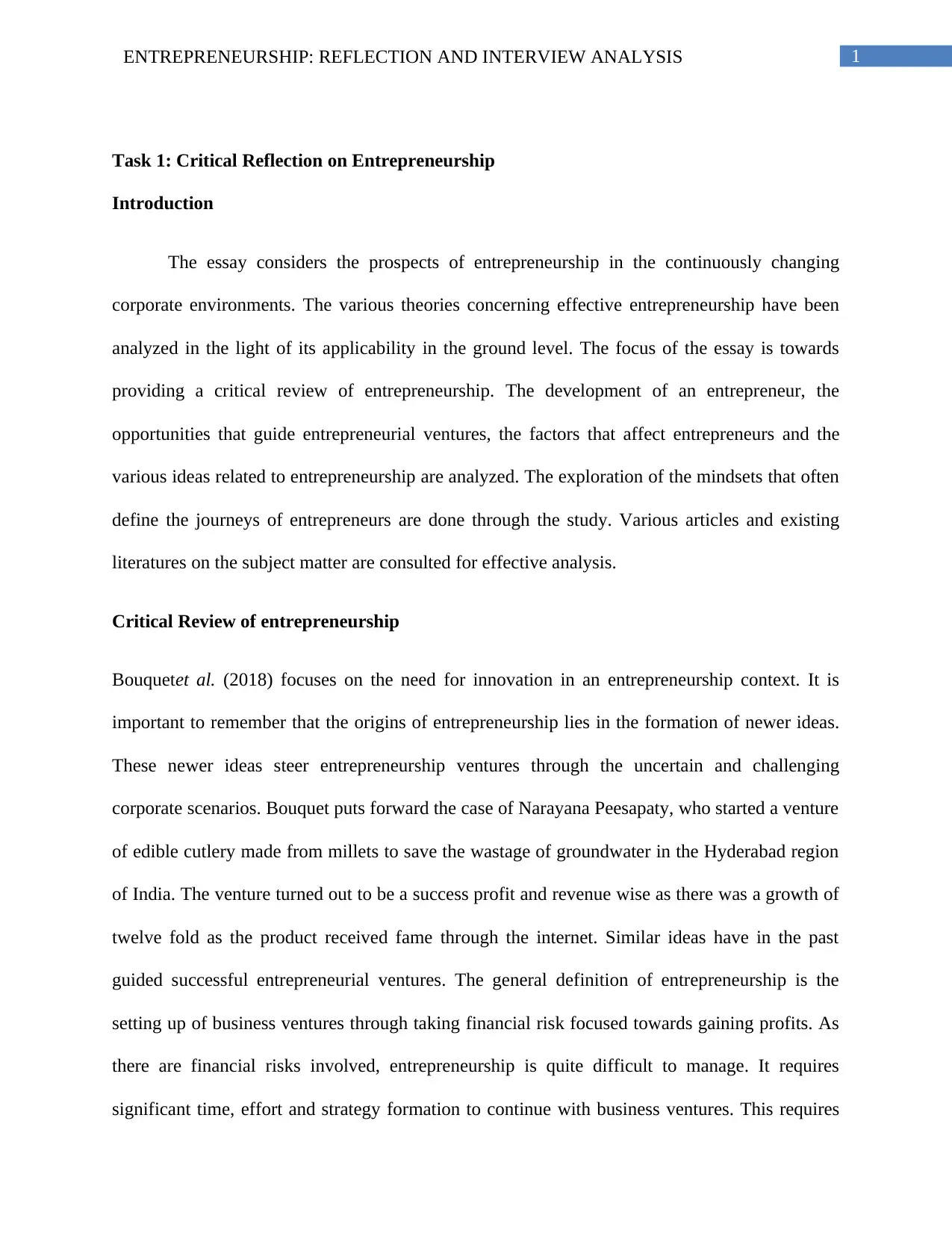
ENTREPRENEURSHIP: REFLECTION AND INTERVIEW ANALYSIS 1
Task 1: Critical Reflection on Entrepreneurship
Introduction
The essay considers the prospects of entrepreneurship in the continuously changing
corporate environments. The various theories concerning effective entrepreneurship have been
analyzed in the light of its applicability in the ground level. The focus of the essay is towards
providing a critical review of entrepreneurship. The development of an entrepreneur, the
opportunities that guide entrepreneurial ventures, the factors that affect entrepreneurs and the
various ideas related to entrepreneurship are analyzed. The exploration of the mindsets that often
define the journeys of entrepreneurs are done through the study. Various articles and existing
literatures on the subject matter are consulted for effective analysis.
Critical Review of entrepreneurship
Bouquetet al. (2018) focuses on the need for innovation in an entrepreneurship context. It is
important to remember that the origins of entrepreneurship lies in the formation of newer ideas.
These newer ideas steer entrepreneurship ventures through the uncertain and challenging
corporate scenarios. Bouquet puts forward the case of Narayana Peesapaty, who started a venture
of edible cutlery made from millets to save the wastage of groundwater in the Hyderabad region
of India. The venture turned out to be a success profit and revenue wise as there was a growth of
twelve fold as the product received fame through the internet. Similar ideas have in the past
guided successful entrepreneurial ventures. The general definition of entrepreneurship is the
setting up of business ventures through taking financial risk focused towards gaining profits. As
there are financial risks involved, entrepreneurship is quite difficult to manage. It requires
significant time, effort and strategy formation to continue with business ventures. This requires
Task 1: Critical Reflection on Entrepreneurship
Introduction
The essay considers the prospects of entrepreneurship in the continuously changing
corporate environments. The various theories concerning effective entrepreneurship have been
analyzed in the light of its applicability in the ground level. The focus of the essay is towards
providing a critical review of entrepreneurship. The development of an entrepreneur, the
opportunities that guide entrepreneurial ventures, the factors that affect entrepreneurs and the
various ideas related to entrepreneurship are analyzed. The exploration of the mindsets that often
define the journeys of entrepreneurs are done through the study. Various articles and existing
literatures on the subject matter are consulted for effective analysis.
Critical Review of entrepreneurship
Bouquetet al. (2018) focuses on the need for innovation in an entrepreneurship context. It is
important to remember that the origins of entrepreneurship lies in the formation of newer ideas.
These newer ideas steer entrepreneurship ventures through the uncertain and challenging
corporate scenarios. Bouquet puts forward the case of Narayana Peesapaty, who started a venture
of edible cutlery made from millets to save the wastage of groundwater in the Hyderabad region
of India. The venture turned out to be a success profit and revenue wise as there was a growth of
twelve fold as the product received fame through the internet. Similar ideas have in the past
guided successful entrepreneurial ventures. The general definition of entrepreneurship is the
setting up of business ventures through taking financial risk focused towards gaining profits. As
there are financial risks involved, entrepreneurship is quite difficult to manage. It requires
significant time, effort and strategy formation to continue with business ventures. This requires
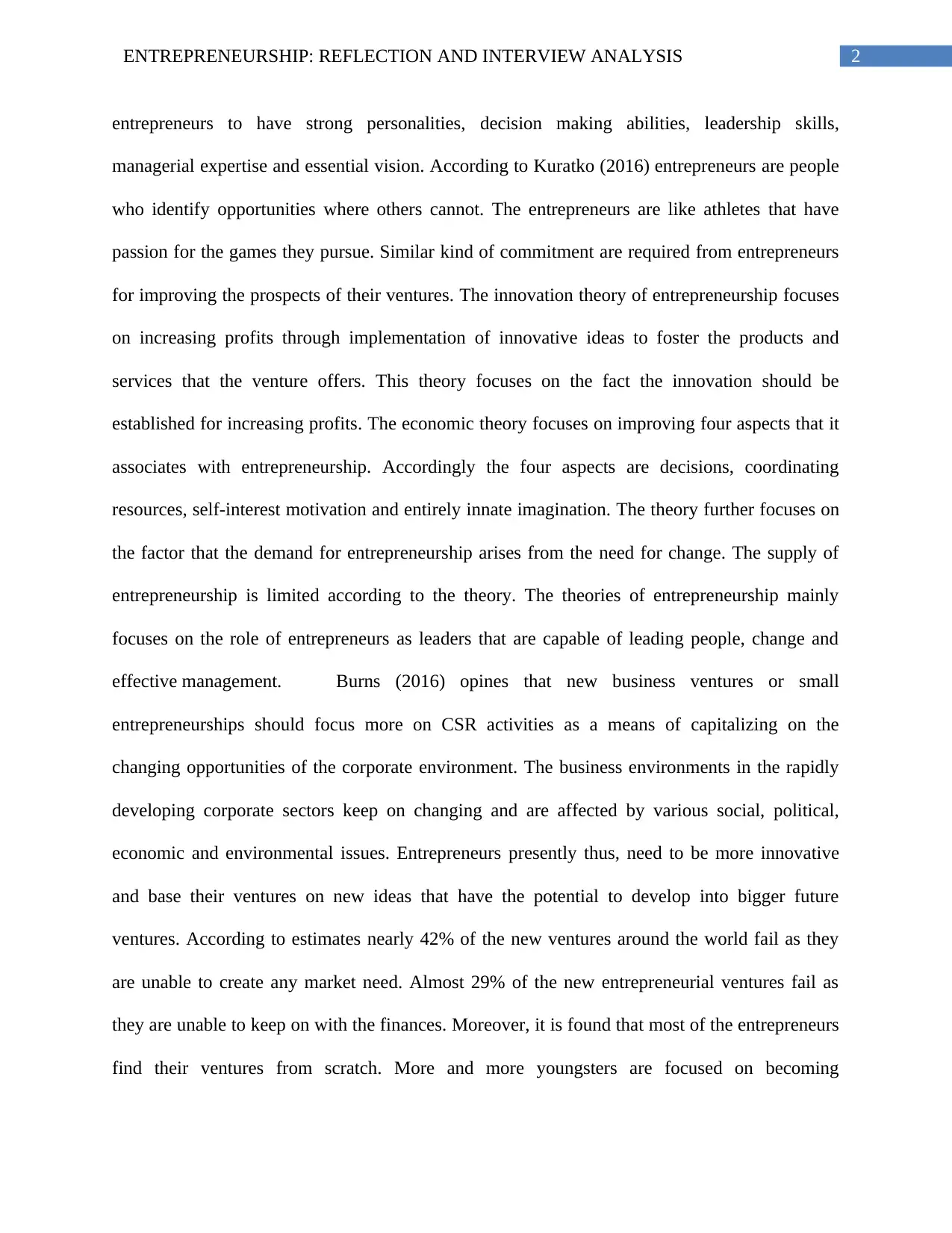
2ENTREPRENEURSHIP: REFLECTION AND INTERVIEW ANALYSIS
entrepreneurs to have strong personalities, decision making abilities, leadership skills,
managerial expertise and essential vision. According to Kuratko (2016) entrepreneurs are people
who identify opportunities where others cannot. The entrepreneurs are like athletes that have
passion for the games they pursue. Similar kind of commitment are required from entrepreneurs
for improving the prospects of their ventures. The innovation theory of entrepreneurship focuses
on increasing profits through implementation of innovative ideas to foster the products and
services that the venture offers. This theory focuses on the fact the innovation should be
established for increasing profits. The economic theory focuses on improving four aspects that it
associates with entrepreneurship. Accordingly the four aspects are decisions, coordinating
resources, self-interest motivation and entirely innate imagination. The theory further focuses on
the factor that the demand for entrepreneurship arises from the need for change. The supply of
entrepreneurship is limited according to the theory. The theories of entrepreneurship mainly
focuses on the role of entrepreneurs as leaders that are capable of leading people, change and
effective management. Burns (2016) opines that new business ventures or small
entrepreneurships should focus more on CSR activities as a means of capitalizing on the
changing opportunities of the corporate environment. The business environments in the rapidly
developing corporate sectors keep on changing and are affected by various social, political,
economic and environmental issues. Entrepreneurs presently thus, need to be more innovative
and base their ventures on new ideas that have the potential to develop into bigger future
ventures. According to estimates nearly 42% of the new ventures around the world fail as they
are unable to create any market need. Almost 29% of the new entrepreneurial ventures fail as
they are unable to keep on with the finances. Moreover, it is found that most of the entrepreneurs
find their ventures from scratch. More and more youngsters are focused on becoming
entrepreneurs to have strong personalities, decision making abilities, leadership skills,
managerial expertise and essential vision. According to Kuratko (2016) entrepreneurs are people
who identify opportunities where others cannot. The entrepreneurs are like athletes that have
passion for the games they pursue. Similar kind of commitment are required from entrepreneurs
for improving the prospects of their ventures. The innovation theory of entrepreneurship focuses
on increasing profits through implementation of innovative ideas to foster the products and
services that the venture offers. This theory focuses on the fact the innovation should be
established for increasing profits. The economic theory focuses on improving four aspects that it
associates with entrepreneurship. Accordingly the four aspects are decisions, coordinating
resources, self-interest motivation and entirely innate imagination. The theory further focuses on
the factor that the demand for entrepreneurship arises from the need for change. The supply of
entrepreneurship is limited according to the theory. The theories of entrepreneurship mainly
focuses on the role of entrepreneurs as leaders that are capable of leading people, change and
effective management. Burns (2016) opines that new business ventures or small
entrepreneurships should focus more on CSR activities as a means of capitalizing on the
changing opportunities of the corporate environment. The business environments in the rapidly
developing corporate sectors keep on changing and are affected by various social, political,
economic and environmental issues. Entrepreneurs presently thus, need to be more innovative
and base their ventures on new ideas that have the potential to develop into bigger future
ventures. According to estimates nearly 42% of the new ventures around the world fail as they
are unable to create any market need. Almost 29% of the new entrepreneurial ventures fail as
they are unable to keep on with the finances. Moreover, it is found that most of the entrepreneurs
find their ventures from scratch. More and more youngsters are focused on becoming
⊘ This is a preview!⊘
Do you want full access?
Subscribe today to unlock all pages.

Trusted by 1+ million students worldwide
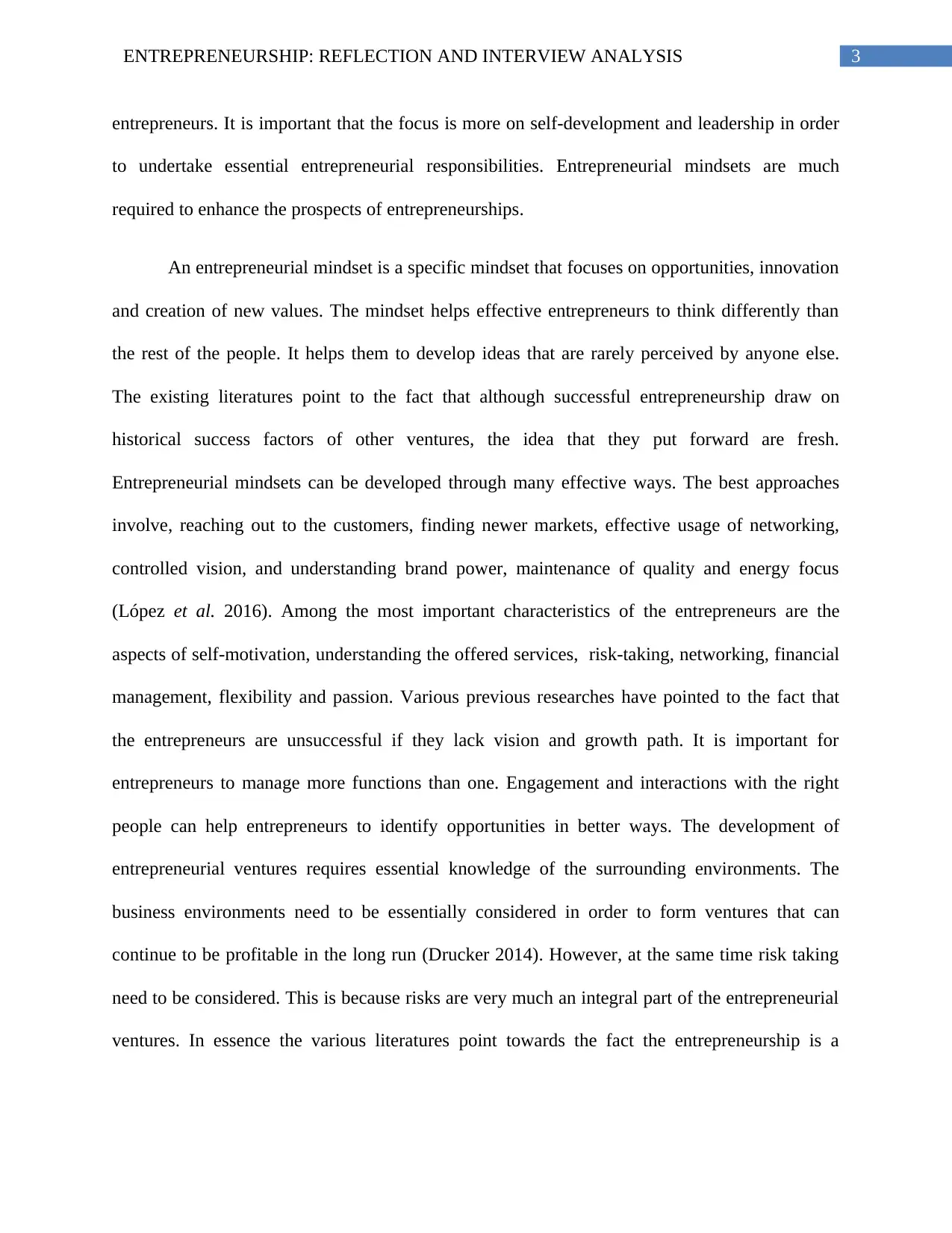
3ENTREPRENEURSHIP: REFLECTION AND INTERVIEW ANALYSIS
entrepreneurs. It is important that the focus is more on self-development and leadership in order
to undertake essential entrepreneurial responsibilities. Entrepreneurial mindsets are much
required to enhance the prospects of entrepreneurships.
An entrepreneurial mindset is a specific mindset that focuses on opportunities, innovation
and creation of new values. The mindset helps effective entrepreneurs to think differently than
the rest of the people. It helps them to develop ideas that are rarely perceived by anyone else.
The existing literatures point to the fact that although successful entrepreneurship draw on
historical success factors of other ventures, the idea that they put forward are fresh.
Entrepreneurial mindsets can be developed through many effective ways. The best approaches
involve, reaching out to the customers, finding newer markets, effective usage of networking,
controlled vision, and understanding brand power, maintenance of quality and energy focus
(López et al. 2016). Among the most important characteristics of the entrepreneurs are the
aspects of self-motivation, understanding the offered services, risk-taking, networking, financial
management, flexibility and passion. Various previous researches have pointed to the fact that
the entrepreneurs are unsuccessful if they lack vision and growth path. It is important for
entrepreneurs to manage more functions than one. Engagement and interactions with the right
people can help entrepreneurs to identify opportunities in better ways. The development of
entrepreneurial ventures requires essential knowledge of the surrounding environments. The
business environments need to be essentially considered in order to form ventures that can
continue to be profitable in the long run (Drucker 2014). However, at the same time risk taking
need to be considered. This is because risks are very much an integral part of the entrepreneurial
ventures. In essence the various literatures point towards the fact the entrepreneurship is a
entrepreneurs. It is important that the focus is more on self-development and leadership in order
to undertake essential entrepreneurial responsibilities. Entrepreneurial mindsets are much
required to enhance the prospects of entrepreneurships.
An entrepreneurial mindset is a specific mindset that focuses on opportunities, innovation
and creation of new values. The mindset helps effective entrepreneurs to think differently than
the rest of the people. It helps them to develop ideas that are rarely perceived by anyone else.
The existing literatures point to the fact that although successful entrepreneurship draw on
historical success factors of other ventures, the idea that they put forward are fresh.
Entrepreneurial mindsets can be developed through many effective ways. The best approaches
involve, reaching out to the customers, finding newer markets, effective usage of networking,
controlled vision, and understanding brand power, maintenance of quality and energy focus
(López et al. 2016). Among the most important characteristics of the entrepreneurs are the
aspects of self-motivation, understanding the offered services, risk-taking, networking, financial
management, flexibility and passion. Various previous researches have pointed to the fact that
the entrepreneurs are unsuccessful if they lack vision and growth path. It is important for
entrepreneurs to manage more functions than one. Engagement and interactions with the right
people can help entrepreneurs to identify opportunities in better ways. The development of
entrepreneurial ventures requires essential knowledge of the surrounding environments. The
business environments need to be essentially considered in order to form ventures that can
continue to be profitable in the long run (Drucker 2014). However, at the same time risk taking
need to be considered. This is because risks are very much an integral part of the entrepreneurial
ventures. In essence the various literatures point towards the fact the entrepreneurship is a
Paraphrase This Document
Need a fresh take? Get an instant paraphrase of this document with our AI Paraphraser
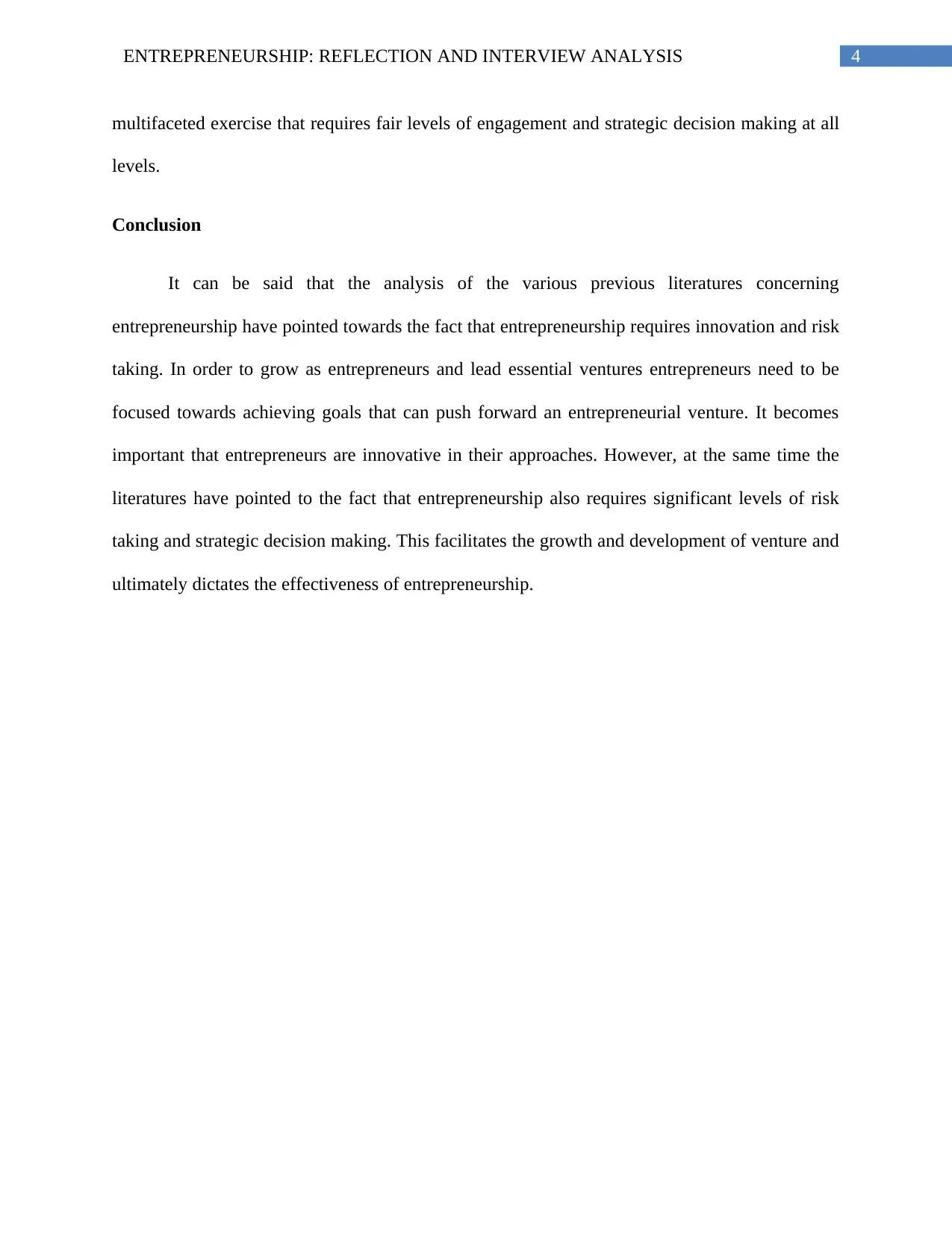
4ENTREPRENEURSHIP: REFLECTION AND INTERVIEW ANALYSIS
multifaceted exercise that requires fair levels of engagement and strategic decision making at all
levels.
Conclusion
It can be said that the analysis of the various previous literatures concerning
entrepreneurship have pointed towards the fact that entrepreneurship requires innovation and risk
taking. In order to grow as entrepreneurs and lead essential ventures entrepreneurs need to be
focused towards achieving goals that can push forward an entrepreneurial venture. It becomes
important that entrepreneurs are innovative in their approaches. However, at the same time the
literatures have pointed to the fact that entrepreneurship also requires significant levels of risk
taking and strategic decision making. This facilitates the growth and development of venture and
ultimately dictates the effectiveness of entrepreneurship.
multifaceted exercise that requires fair levels of engagement and strategic decision making at all
levels.
Conclusion
It can be said that the analysis of the various previous literatures concerning
entrepreneurship have pointed towards the fact that entrepreneurship requires innovation and risk
taking. In order to grow as entrepreneurs and lead essential ventures entrepreneurs need to be
focused towards achieving goals that can push forward an entrepreneurial venture. It becomes
important that entrepreneurs are innovative in their approaches. However, at the same time the
literatures have pointed to the fact that entrepreneurship also requires significant levels of risk
taking and strategic decision making. This facilitates the growth and development of venture and
ultimately dictates the effectiveness of entrepreneurship.
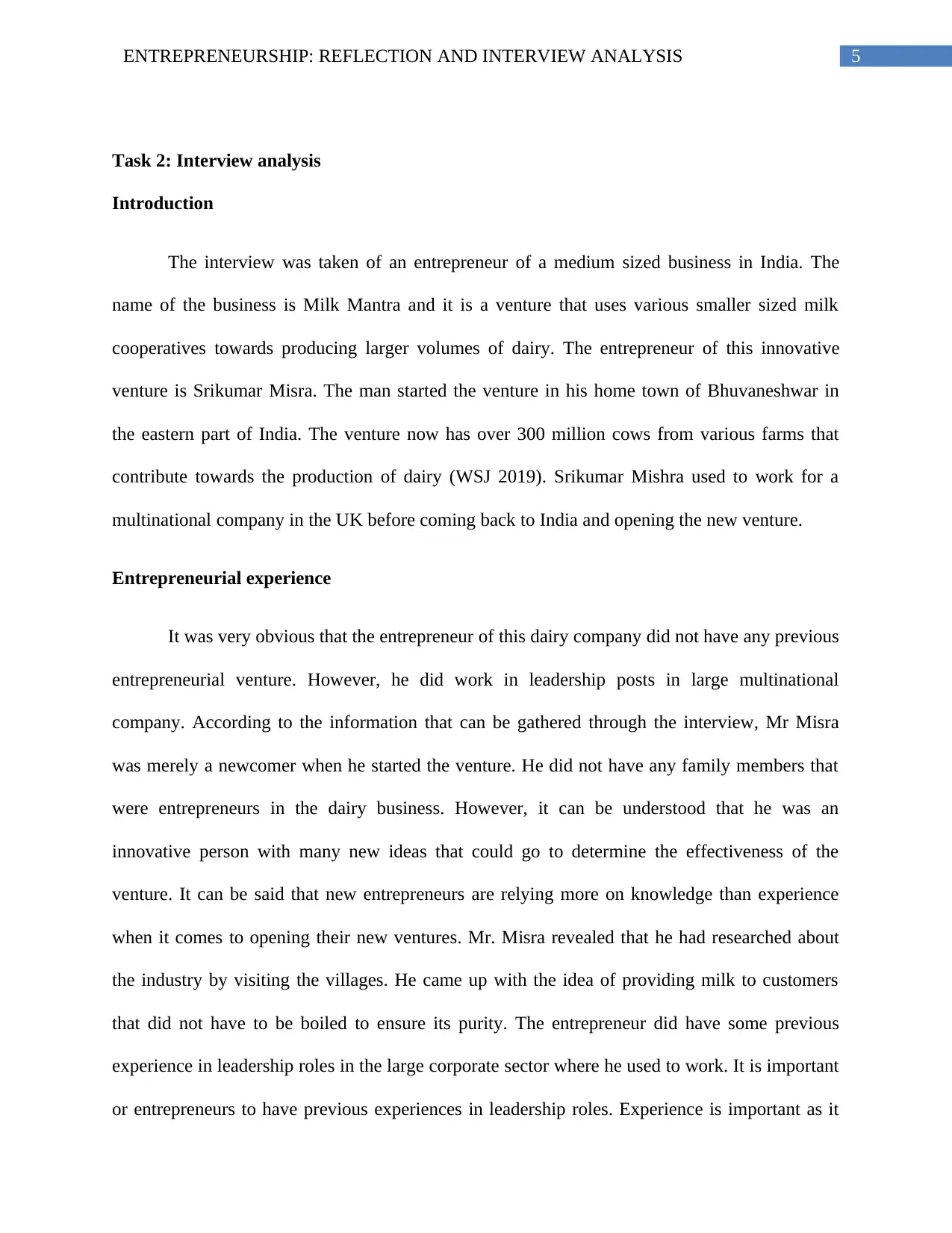
5ENTREPRENEURSHIP: REFLECTION AND INTERVIEW ANALYSIS
Task 2: Interview analysis
Introduction
The interview was taken of an entrepreneur of a medium sized business in India. The
name of the business is Milk Mantra and it is a venture that uses various smaller sized milk
cooperatives towards producing larger volumes of dairy. The entrepreneur of this innovative
venture is Srikumar Misra. The man started the venture in his home town of Bhuvaneshwar in
the eastern part of India. The venture now has over 300 million cows from various farms that
contribute towards the production of dairy (WSJ 2019). Srikumar Mishra used to work for a
multinational company in the UK before coming back to India and opening the new venture.
Entrepreneurial experience
It was very obvious that the entrepreneur of this dairy company did not have any previous
entrepreneurial venture. However, he did work in leadership posts in large multinational
company. According to the information that can be gathered through the interview, Mr Misra
was merely a newcomer when he started the venture. He did not have any family members that
were entrepreneurs in the dairy business. However, it can be understood that he was an
innovative person with many new ideas that could go to determine the effectiveness of the
venture. It can be said that new entrepreneurs are relying more on knowledge than experience
when it comes to opening their new ventures. Mr. Misra revealed that he had researched about
the industry by visiting the villages. He came up with the idea of providing milk to customers
that did not have to be boiled to ensure its purity. The entrepreneur did have some previous
experience in leadership roles in the large corporate sector where he used to work. It is important
or entrepreneurs to have previous experiences in leadership roles. Experience is important as it
Task 2: Interview analysis
Introduction
The interview was taken of an entrepreneur of a medium sized business in India. The
name of the business is Milk Mantra and it is a venture that uses various smaller sized milk
cooperatives towards producing larger volumes of dairy. The entrepreneur of this innovative
venture is Srikumar Misra. The man started the venture in his home town of Bhuvaneshwar in
the eastern part of India. The venture now has over 300 million cows from various farms that
contribute towards the production of dairy (WSJ 2019). Srikumar Mishra used to work for a
multinational company in the UK before coming back to India and opening the new venture.
Entrepreneurial experience
It was very obvious that the entrepreneur of this dairy company did not have any previous
entrepreneurial venture. However, he did work in leadership posts in large multinational
company. According to the information that can be gathered through the interview, Mr Misra
was merely a newcomer when he started the venture. He did not have any family members that
were entrepreneurs in the dairy business. However, it can be understood that he was an
innovative person with many new ideas that could go to determine the effectiveness of the
venture. It can be said that new entrepreneurs are relying more on knowledge than experience
when it comes to opening their new ventures. Mr. Misra revealed that he had researched about
the industry by visiting the villages. He came up with the idea of providing milk to customers
that did not have to be boiled to ensure its purity. The entrepreneur did have some previous
experience in leadership roles in the large corporate sector where he used to work. It is important
or entrepreneurs to have previous experiences in leadership roles. Experience is important as it
⊘ This is a preview!⊘
Do you want full access?
Subscribe today to unlock all pages.

Trusted by 1+ million students worldwide
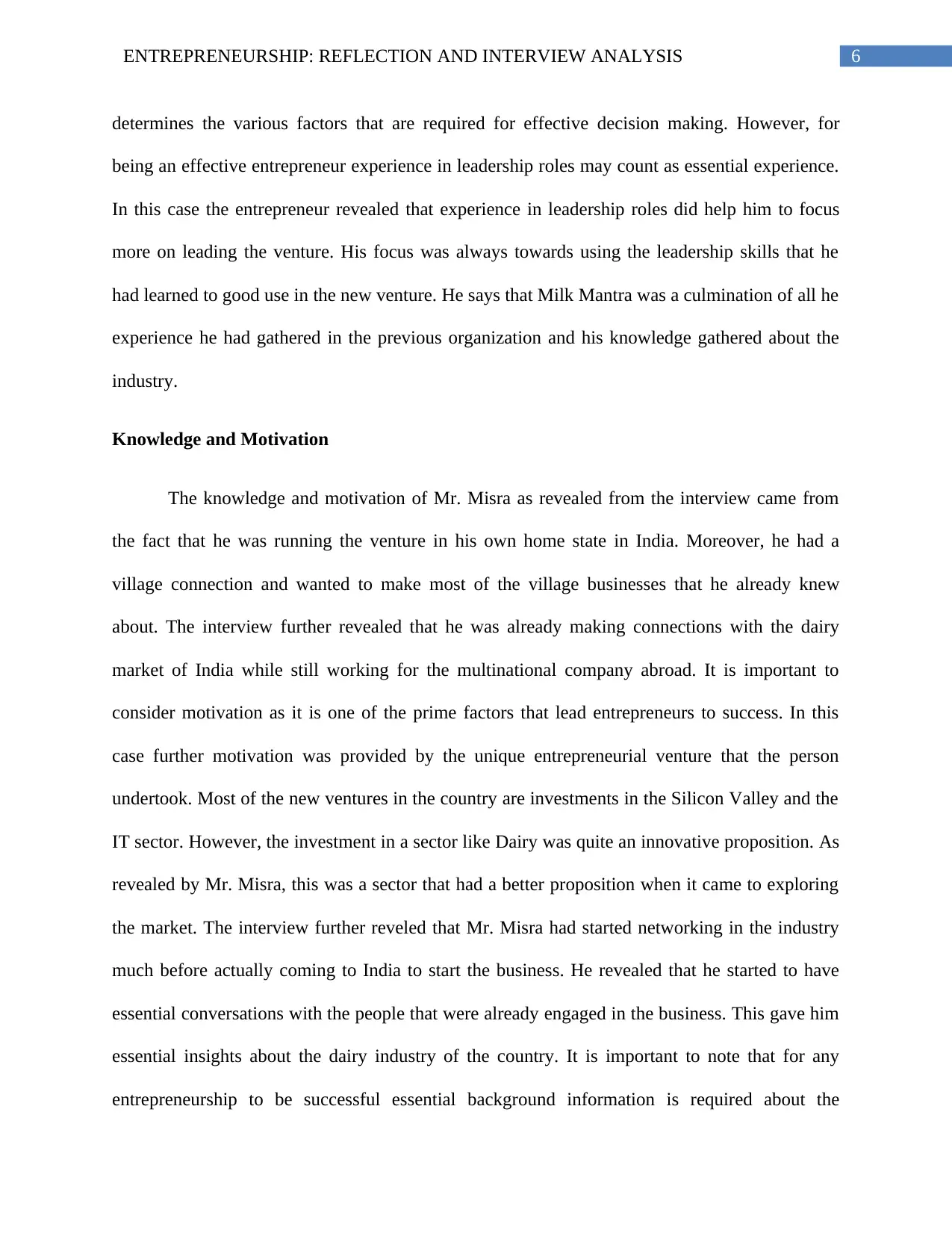
6ENTREPRENEURSHIP: REFLECTION AND INTERVIEW ANALYSIS
determines the various factors that are required for effective decision making. However, for
being an effective entrepreneur experience in leadership roles may count as essential experience.
In this case the entrepreneur revealed that experience in leadership roles did help him to focus
more on leading the venture. His focus was always towards using the leadership skills that he
had learned to good use in the new venture. He says that Milk Mantra was a culmination of all he
experience he had gathered in the previous organization and his knowledge gathered about the
industry.
Knowledge and Motivation
The knowledge and motivation of Mr. Misra as revealed from the interview came from
the fact that he was running the venture in his own home state in India. Moreover, he had a
village connection and wanted to make most of the village businesses that he already knew
about. The interview further revealed that he was already making connections with the dairy
market of India while still working for the multinational company abroad. It is important to
consider motivation as it is one of the prime factors that lead entrepreneurs to success. In this
case further motivation was provided by the unique entrepreneurial venture that the person
undertook. Most of the new ventures in the country are investments in the Silicon Valley and the
IT sector. However, the investment in a sector like Dairy was quite an innovative proposition. As
revealed by Mr. Misra, this was a sector that had a better proposition when it came to exploring
the market. The interview further reveled that Mr. Misra had started networking in the industry
much before actually coming to India to start the business. He revealed that he started to have
essential conversations with the people that were already engaged in the business. This gave him
essential insights about the dairy industry of the country. It is important to note that for any
entrepreneurship to be successful essential background information is required about the
determines the various factors that are required for effective decision making. However, for
being an effective entrepreneur experience in leadership roles may count as essential experience.
In this case the entrepreneur revealed that experience in leadership roles did help him to focus
more on leading the venture. His focus was always towards using the leadership skills that he
had learned to good use in the new venture. He says that Milk Mantra was a culmination of all he
experience he had gathered in the previous organization and his knowledge gathered about the
industry.
Knowledge and Motivation
The knowledge and motivation of Mr. Misra as revealed from the interview came from
the fact that he was running the venture in his own home state in India. Moreover, he had a
village connection and wanted to make most of the village businesses that he already knew
about. The interview further revealed that he was already making connections with the dairy
market of India while still working for the multinational company abroad. It is important to
consider motivation as it is one of the prime factors that lead entrepreneurs to success. In this
case further motivation was provided by the unique entrepreneurial venture that the person
undertook. Most of the new ventures in the country are investments in the Silicon Valley and the
IT sector. However, the investment in a sector like Dairy was quite an innovative proposition. As
revealed by Mr. Misra, this was a sector that had a better proposition when it came to exploring
the market. The interview further reveled that Mr. Misra had started networking in the industry
much before actually coming to India to start the business. He revealed that he started to have
essential conversations with the people that were already engaged in the business. This gave him
essential insights about the dairy industry of the country. It is important to note that for any
entrepreneurship to be successful essential background information is required about the
Paraphrase This Document
Need a fresh take? Get an instant paraphrase of this document with our AI Paraphraser
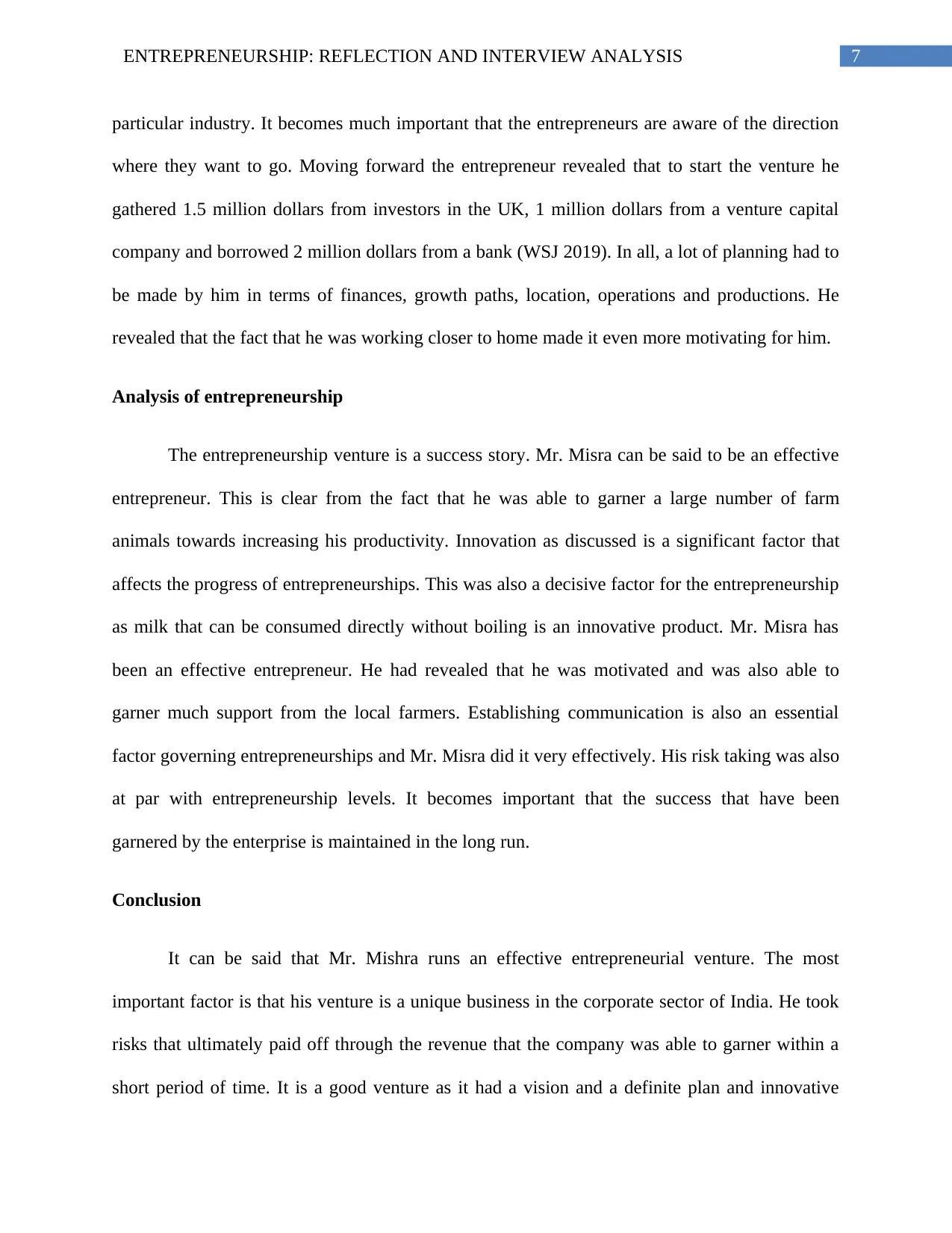
7ENTREPRENEURSHIP: REFLECTION AND INTERVIEW ANALYSIS
particular industry. It becomes much important that the entrepreneurs are aware of the direction
where they want to go. Moving forward the entrepreneur revealed that to start the venture he
gathered 1.5 million dollars from investors in the UK, 1 million dollars from a venture capital
company and borrowed 2 million dollars from a bank (WSJ 2019). In all, a lot of planning had to
be made by him in terms of finances, growth paths, location, operations and productions. He
revealed that the fact that he was working closer to home made it even more motivating for him.
Analysis of entrepreneurship
The entrepreneurship venture is a success story. Mr. Misra can be said to be an effective
entrepreneur. This is clear from the fact that he was able to garner a large number of farm
animals towards increasing his productivity. Innovation as discussed is a significant factor that
affects the progress of entrepreneurships. This was also a decisive factor for the entrepreneurship
as milk that can be consumed directly without boiling is an innovative product. Mr. Misra has
been an effective entrepreneur. He had revealed that he was motivated and was also able to
garner much support from the local farmers. Establishing communication is also an essential
factor governing entrepreneurships and Mr. Misra did it very effectively. His risk taking was also
at par with entrepreneurship levels. It becomes important that the success that have been
garnered by the enterprise is maintained in the long run.
Conclusion
It can be said that Mr. Mishra runs an effective entrepreneurial venture. The most
important factor is that his venture is a unique business in the corporate sector of India. He took
risks that ultimately paid off through the revenue that the company was able to garner within a
short period of time. It is a good venture as it had a vision and a definite plan and innovative
particular industry. It becomes much important that the entrepreneurs are aware of the direction
where they want to go. Moving forward the entrepreneur revealed that to start the venture he
gathered 1.5 million dollars from investors in the UK, 1 million dollars from a venture capital
company and borrowed 2 million dollars from a bank (WSJ 2019). In all, a lot of planning had to
be made by him in terms of finances, growth paths, location, operations and productions. He
revealed that the fact that he was working closer to home made it even more motivating for him.
Analysis of entrepreneurship
The entrepreneurship venture is a success story. Mr. Misra can be said to be an effective
entrepreneur. This is clear from the fact that he was able to garner a large number of farm
animals towards increasing his productivity. Innovation as discussed is a significant factor that
affects the progress of entrepreneurships. This was also a decisive factor for the entrepreneurship
as milk that can be consumed directly without boiling is an innovative product. Mr. Misra has
been an effective entrepreneur. He had revealed that he was motivated and was also able to
garner much support from the local farmers. Establishing communication is also an essential
factor governing entrepreneurships and Mr. Misra did it very effectively. His risk taking was also
at par with entrepreneurship levels. It becomes important that the success that have been
garnered by the enterprise is maintained in the long run.
Conclusion
It can be said that Mr. Mishra runs an effective entrepreneurial venture. The most
important factor is that his venture is a unique business in the corporate sector of India. He took
risks that ultimately paid off through the revenue that the company was able to garner within a
short period of time. It is a good venture as it had a vision and a definite plan and innovative

8ENTREPRENEURSHIP: REFLECTION AND INTERVIEW ANALYSIS
feature. It is important that these kinds of ventures are increasingly started in India and the rest of
the world.
feature. It is important that these kinds of ventures are increasingly started in India and the rest of
the world.
⊘ This is a preview!⊘
Do you want full access?
Subscribe today to unlock all pages.

Trusted by 1+ million students worldwide
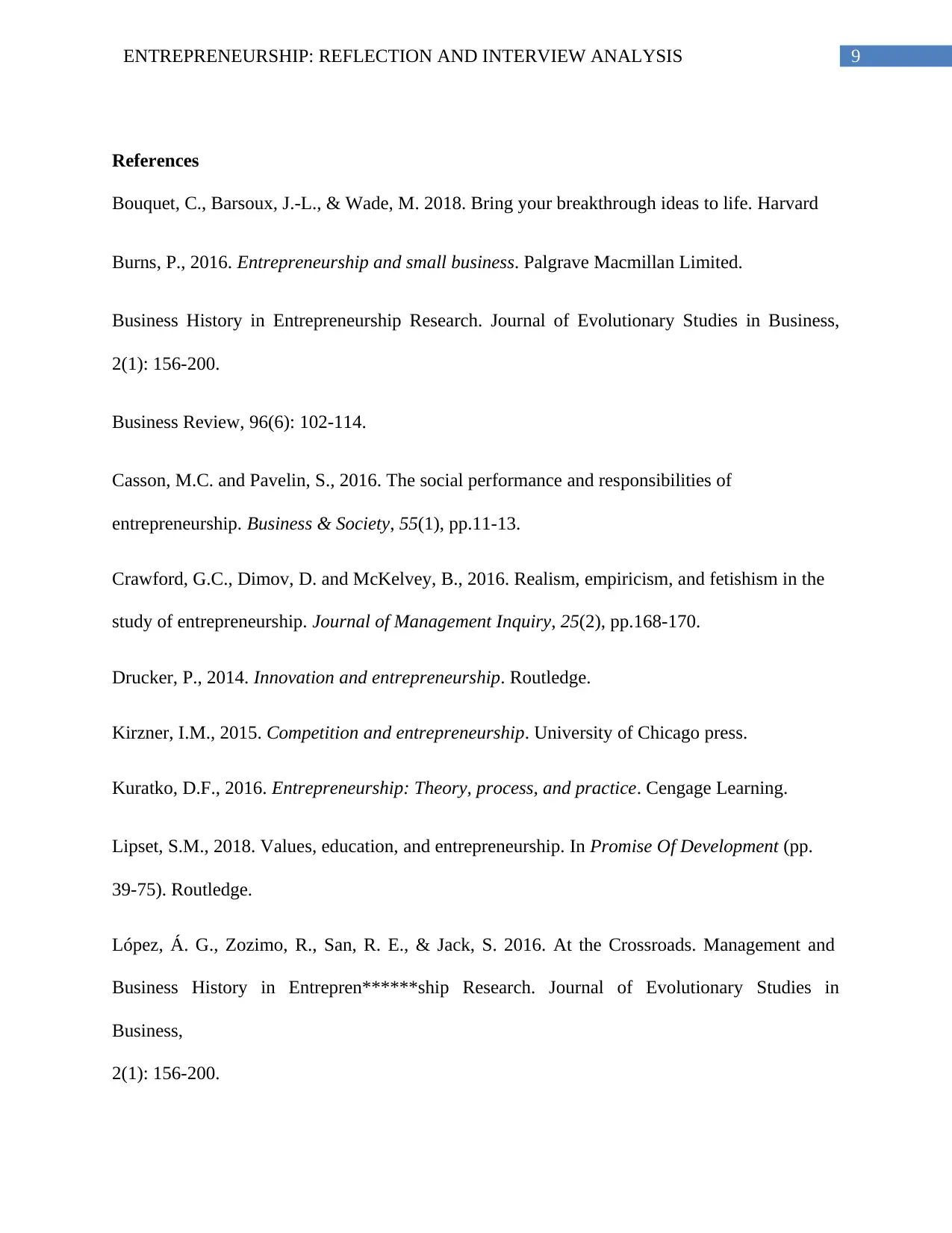
9ENTREPRENEURSHIP: REFLECTION AND INTERVIEW ANALYSIS
References
Bouquet, C., Barsoux, J.-L., & Wade, M. 2018. Bring your breakthrough ideas to life. Harvard
Burns, P., 2016. Entrepreneurship and small business. Palgrave Macmillan Limited.
Business History in Entrepreneurship Research. Journal of Evolutionary Studies in Business,
2(1): 156-200.
Business Review, 96(6): 102-114.
Casson, M.C. and Pavelin, S., 2016. The social performance and responsibilities of
entrepreneurship. Business & Society, 55(1), pp.11-13.
Crawford, G.C., Dimov, D. and McKelvey, B., 2016. Realism, empiricism, and fetishism in the
study of entrepreneurship. Journal of Management Inquiry, 25(2), pp.168-170.
Drucker, P., 2014. Innovation and entrepreneurship. Routledge.
Kirzner, I.M., 2015. Competition and entrepreneurship. University of Chicago press.
Kuratko, D.F., 2016. Entrepreneurship: Theory, process, and practice. Cengage Learning.
Lipset, S.M., 2018. Values, education, and entrepreneurship. In Promise Of Development (pp.
39-75). Routledge.
López, Á. G., Zozimo, R., San, R. E., & Jack, S. 2016. At the Crossroads. Management and
Business History in Entrepren******ship Research. Journal of Evolutionary Studies in
Business,
2(1): 156-200.
References
Bouquet, C., Barsoux, J.-L., & Wade, M. 2018. Bring your breakthrough ideas to life. Harvard
Burns, P., 2016. Entrepreneurship and small business. Palgrave Macmillan Limited.
Business History in Entrepreneurship Research. Journal of Evolutionary Studies in Business,
2(1): 156-200.
Business Review, 96(6): 102-114.
Casson, M.C. and Pavelin, S., 2016. The social performance and responsibilities of
entrepreneurship. Business & Society, 55(1), pp.11-13.
Crawford, G.C., Dimov, D. and McKelvey, B., 2016. Realism, empiricism, and fetishism in the
study of entrepreneurship. Journal of Management Inquiry, 25(2), pp.168-170.
Drucker, P., 2014. Innovation and entrepreneurship. Routledge.
Kirzner, I.M., 2015. Competition and entrepreneurship. University of Chicago press.
Kuratko, D.F., 2016. Entrepreneurship: Theory, process, and practice. Cengage Learning.
Lipset, S.M., 2018. Values, education, and entrepreneurship. In Promise Of Development (pp.
39-75). Routledge.
López, Á. G., Zozimo, R., San, R. E., & Jack, S. 2016. At the Crossroads. Management and
Business History in Entrepren******ship Research. Journal of Evolutionary Studies in
Business,
2(1): 156-200.
Paraphrase This Document
Need a fresh take? Get an instant paraphrase of this document with our AI Paraphraser
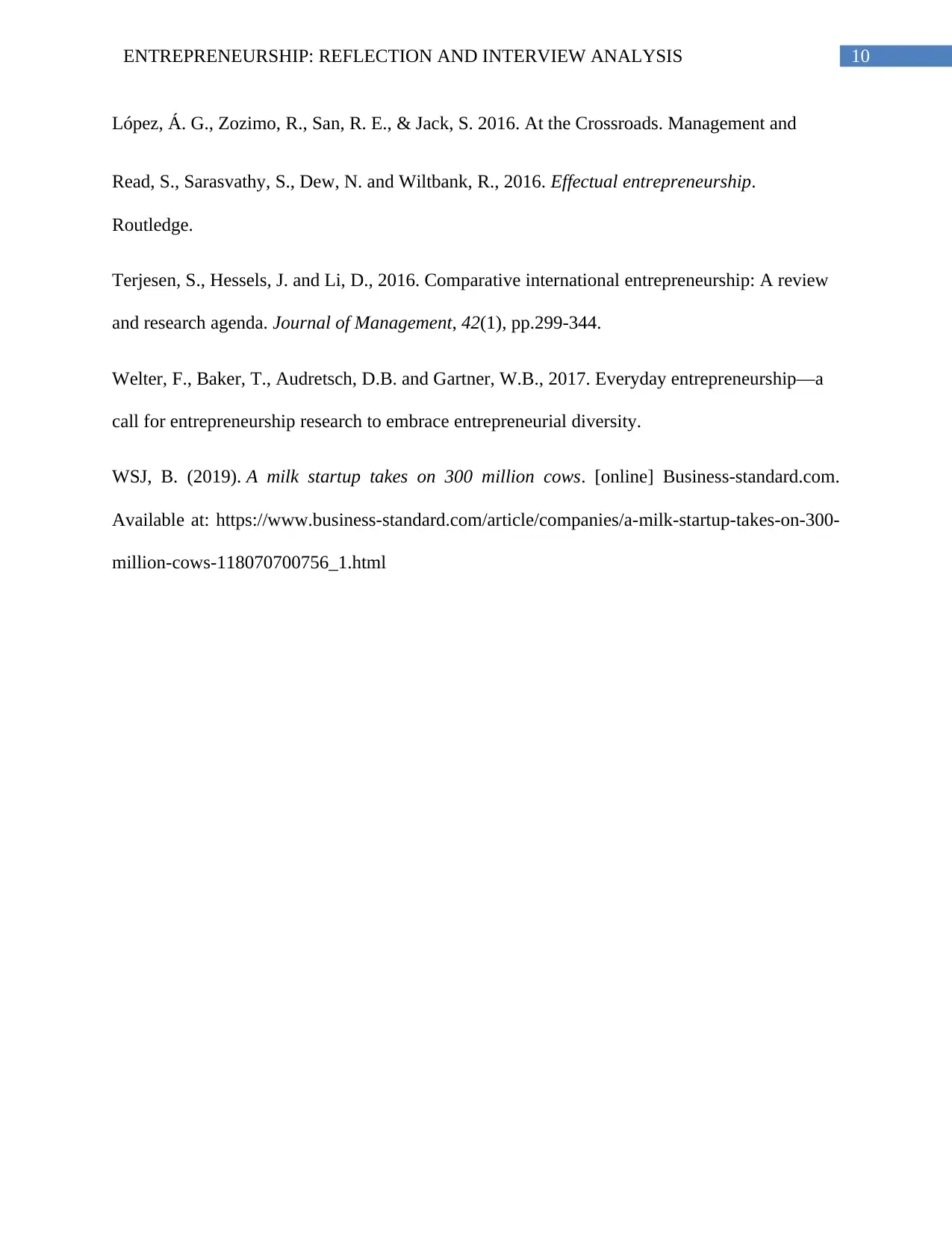
10ENTREPRENEURSHIP: REFLECTION AND INTERVIEW ANALYSIS
López, Á. G., Zozimo, R., San, R. E., & Jack, S. 2016. At the Crossroads. Management and
Read, S., Sarasvathy, S., Dew, N. and Wiltbank, R., 2016. Effectual entrepreneurship.
Routledge.
Terjesen, S., Hessels, J. and Li, D., 2016. Comparative international entrepreneurship: A review
and research agenda. Journal of Management, 42(1), pp.299-344.
Welter, F., Baker, T., Audretsch, D.B. and Gartner, W.B., 2017. Everyday entrepreneurship—a
call for entrepreneurship research to embrace entrepreneurial diversity.
WSJ, B. (2019). A milk startup takes on 300 million cows. [online] Business-standard.com.
Available at: https://www.business-standard.com/article/companies/a-milk-startup-takes-on-300-
million-cows-118070700756_1.html
López, Á. G., Zozimo, R., San, R. E., & Jack, S. 2016. At the Crossroads. Management and
Read, S., Sarasvathy, S., Dew, N. and Wiltbank, R., 2016. Effectual entrepreneurship.
Routledge.
Terjesen, S., Hessels, J. and Li, D., 2016. Comparative international entrepreneurship: A review
and research agenda. Journal of Management, 42(1), pp.299-344.
Welter, F., Baker, T., Audretsch, D.B. and Gartner, W.B., 2017. Everyday entrepreneurship—a
call for entrepreneurship research to embrace entrepreneurial diversity.
WSJ, B. (2019). A milk startup takes on 300 million cows. [online] Business-standard.com.
Available at: https://www.business-standard.com/article/companies/a-milk-startup-takes-on-300-
million-cows-118070700756_1.html

11ENTREPRENEURSHIP: REFLECTION AND INTERVIEW ANALYSIS
⊘ This is a preview!⊘
Do you want full access?
Subscribe today to unlock all pages.

Trusted by 1+ million students worldwide
1 out of 14
Related Documents
Your All-in-One AI-Powered Toolkit for Academic Success.
+13062052269
info@desklib.com
Available 24*7 on WhatsApp / Email
![[object Object]](/_next/static/media/star-bottom.7253800d.svg)
Unlock your academic potential
Copyright © 2020–2026 A2Z Services. All Rights Reserved. Developed and managed by ZUCOL.




